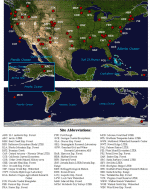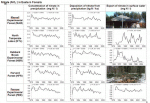The EcoTrends Project began in 2004 as a casual conversation about the need for easy access to many long-term data sets to allow cross-site comparisons. This conversation between Deb Peters (Jornada LTER, United States Department of Agriculture's Agricultural Research Service (USDA-ARS)) and Ariel Lugo (Luquillo LTER, USDA-Forest Service (USDA-FS)) has resulted in the synthesis of more than 20,000 datasets from 50 sites (including LTER, USDA-ARS, USDA-FS, and other agencies) (Fig. 1) that will be available soon on the EcoTrends web site (http://www.ecotrends.info). Many of these datasets will be included in a book to be submitted for publication in the next few months.
At the core of EcoTrends are two key aspects:
- A focus on derived data whereby complicated datasets are condensed into annually, monthly, or seasonally derived values
- Attribution to the original data source.
Both the book and the web site will be invaluable as the LTER Network proceeds in its development of network-level synthetic research for the next decade. Funding for the project is through National Science Foundation (NSF) supplements to the Jornada LTER and the LTER Network Office (LNO), and support from the USDA ARS.
The EcoTrends book illustrates through detailed examples the value and importance of comparing long-term data (in most cases greater than 10 years) from different ecosystem types (e.g., forests, grasslands, deserts, freshwater lakes and streams, near coastal marine and estuaries, urban, Arctic, and Antarctic). The book shows the power of a geographically-distributed network of sites studying long-term phenomenon on similar themes (e.g., response to climate and disturbances, patterns through time in biogeochemistry, biotic structure, and human populations). The book format is designed to enable users to view patterns in data from many sites, and to easily understand the lessons learned from long-term data (Fig. 2)
After a thorough analysis of publishers, the EcoTrends Editorial Committee selected the USDA-ARS publish the book. Using a federal government agency will promote a wide distribution by keeping the cost of the book reasonable, and USDA-ARS will allow free downloads of the online version of the book.
The accompanying EcoTrends website will contain all of the derived data in the book and additional datasets with their associated metadata along with links to the original data sources. Users will be able to search and query the database, create new graphs and combinations of variables, and save graphs and data locally. Future modifications, pending additional funding, include the automatic harvesting of data to keep the derived database up-to-date, and the inclusion of more sites and datasets. Development of the website application has occurred primarily through efforts by Mark Servilla and Duane Costa at the LNO, with input from the Editorial Committee.
The success of this project depends heavily on an active Editorial Committee, comprising S. Collins (SEV), C. Driscoll (HBR), P. Groffman (HBR), M. Grove (BES), T. Kratz (NTL), A. Lugo (LUQ), M. Ohman (CCE), D. Peters (JRN), R. Waide (LNO), interacting closely with the project coordinator (C. Laney, JRN), technical staff at the LNO (M. Servilla; D. Costa, J. Brunt, I. San Gil), members of LTER committees (K. Ramsey and D. Henshaw [Information Management Committee]; W. Sheldon [NISAC]; Charlene d'Avanzo [Education]), and site-based Information Managers and scientists as well as collaborations with the National Center for Ecological Analysis and Synthesis, (M. Schildhauer). C. Boone (BES), T. Gragson (CWT), and N. Rosamilia (CWT) compiled the human population and economy data for all 23 LTER sites where data were collected. These data currently reside on the Coweeta website (http://coweeta.ecology.uga.edu/trends/catalog_trends_base2.php), and are being incorporated into the EcoTrends website.
The next steps in the project are three-fold.
- First, we will continue to populate the EcoTrends database. To ensure the quality of the data, the lead PI and IM of each site are checking the quality of their data prior to its publication and posting.
- Second, we plan to complete the text and figures for the book within the next few months. At that time, we will request reviews from within the network to ensure that a high quality product is obtained.
- Finally, we will continue to promote EcoTrends to broader audiences. For example, the EcoTrends project was endorsed by the Ecological Society of America, with each website now providing a link to the other.
In addition, six working groups are meeting between April and July (2009) to take advantage of the wealth of comparable data in the EcoTrends database. These working groups consist of scientists nominated by each site for their expertise in one of the themes (Disturbance, NPP_Biodiversity, Biogeochemistry, Human Populations and Economy, and Animal Populations). Working groups are developing synthesis products and providing input on the database and website functionality.
Although it is widely recognized that the Earth's environment is changing, and that long-term data are needed to assess the rate and direction of change, to distinguish directional trends from short-term variability, and to forecast future responses, the accessibility of long-term data beyond the original user has historically been limited. The EcoTrends project, now nearing completion of an important step in its development, is a network-level resource that will allow cross-site and network-wide comparisons that are critical to addressing ecological problems relevant to the LTER Decadal Plan.
For additional information please contact Debra Peters, Project Leader (debpeter@nmsu.edu) or Christine Laney, Project Coordinator (chrlaney@nmsu.edu).

 Enlarge this image
Enlarge this image
